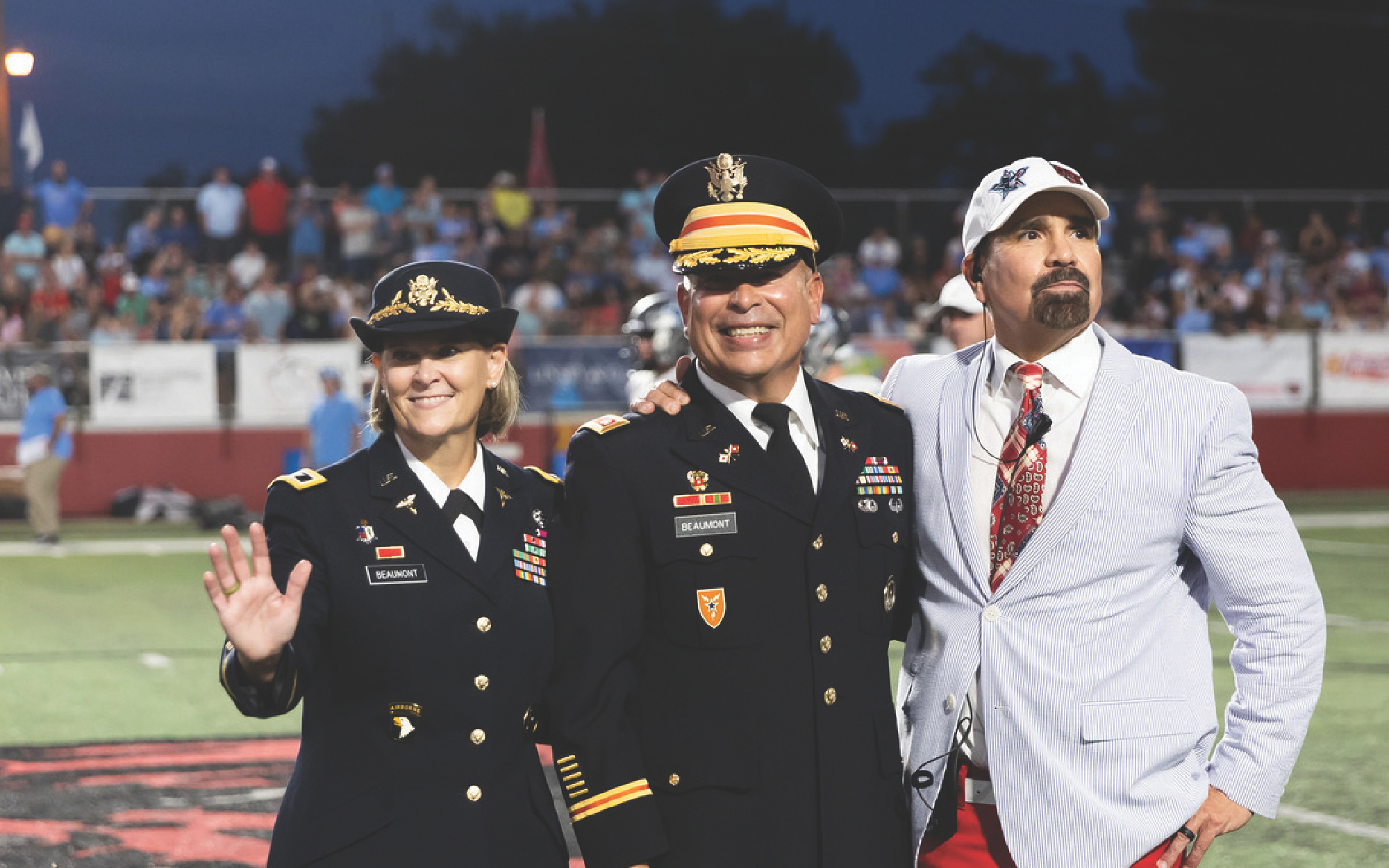When Michael Beaumont charged onto the field with the Arkansas Razorbacks football team, it seemed too good to be true. The year was 2006, and Michael was recently hired to help with special teams, serve as academic counselor for the offensive team, and work with operations. Now, there he was, with the U of A marching band forming the letter “A” in front of him and the crowd beyond, mostly dressed in Razorback red, raising the roof, as only tens of thousands of fans can do.
As his feet hit the turf, Michael looked for familiar faces. There in the stands stood his wife, Susan, and their two daughters. Michael’s heart swelled so much it almost felt like a medical emergency. After he got his bearings, he spotted some of his former Lincoln High School football players. Teens he’d been coaching just weeks before.
He would still have been coaching at the high school level, but the phone call came. Houston Nutt, Arkansas’ head football coach from 1998 to 2007, wanted Michael, Lincoln High’s coach and athletic director, to join his staff.
Michael had been in the head coach’s sights for years. “I worked football camps for Coach Nutt during the summer. Any and every football camp the university had, I was at. I did that for nine years, every summer, trying to learn, but I also had that dream of getting noticed.”
His plan finally worked. In the midst of acclimating, he found a friend in Coach Louis Campbell. “He gave me a crash course on how to lead a collegiate football program from the administrative side.”
In early 2008, Houston Nutt left Arkansas for Mississippi. In Oxford, he took control of the Ole Miss football program, bringing Michael along as assistant athletic director and head of operations.
College sports is a fickle business, and in 2011, Coach Nutt was fired, which meant he and Michael were out of a job. In 2012, Michael found himself at the University of Tennessee.
“I had done a college internship at Knoxville. I met Pat [Summit] and Holly [Warlick] back then. Fast forward twenty-four years, and they’re in the SEC. I’m in the SEC. We rekindled our friendship… I was asked to come and interview, and I did. I became the head of basketball administration for the Lady Vols, so I go from a world of testosterone to a world of estrogen.”
When the team traveled, the women needed extra time to get ready and several more changes of clothes. Michael’s rigid schedule he’d designed didn’t allow for that. He laughs, remembering Coach Warlick taking him aside to explain. “I wasn’t coaching men’s football anymore.”
He’d arrived at a fraught time. In 2011, Coach Summit announced she had early-onset Alzheimer’s disease. Michael’s heart broke for her and for Coach Warlick. “They were friends for more than thirty years. They were like sisters,” said Michael.
“You see this persona on TV of this hard college coach, this leader of people, but, man, those two women had the biggest hearts in the world.”
Coach Summit died in June 2016 at sixty-four years of age. She’d coached the Lady Vols for thirty-eight winning seasons, becoming the first NCAA coach to amass 1,000 wins and earning eight national championships. Michael calls her hands-down the best basketball coach that ever lived.
“My years of learning from Coach Nutt and Coach [Frank] Broyles, and now my years of learning from Pat Summit and Holly Warlick, made me afraid that this dream would end. That someone would pop the bubble. At Tennessee, we win the SEC, we go to NCAA tournaments, we go to championships. I was lucky and blessed.”
In 2019, Fort Smith Public Schools was looking for a director of athletics and activities, and the position caught Michael’s attention. “I’d been an administrator. I’d worked with male and female athletes. I was ready for a new challenge.” And in a way, he was coming home.
Just one mile from Michael’s office sits Immaculate Conception Catholic Church, where his parents, Wayne and Connie, were married fifty-seven years ago. His mom came from Peru and was attending the St. Edward Nursing College. His dad was playing baseball for Westark Community College (now UAFS). “It’s been a full-circle life,” Michael says. “The Lord has a way of bringing everybody back to where you start from.”
Michael’s dad, Wayne, had served two tours of duty in Vietnam. He’d retired as a sergeant in the U.S. Army. But Wayne was also a teacher, an administrator, and one heck of a coach.
“Dad was the greatest man I’ve ever known. He taught us to be humble, whether we’re winning or losing. Whether it’s greatness or failure. I think you could ask anyone who played for him or was a student of his, and they’d say he loved them. He was hard; he was a disciplinarian. He was two cups love and one cup discipline.”
Growing up, Michael played several sports and tried to play the saxophone in the sixth grade. He didn’t last a semester.
He went to college on a baseball scholarship. “The funny thing is that when you’re on scholarship, you’re also supposed to go to school. I didn’t do that part very well.” He lost his scholarship, and his father believed the fix would be the United States Army. “In Fort Leonard Wood, Missouri, I learned I should have listened to my father while I was still in school. When I returned to school, I was an incredible student.”
Wayne passed away in October 2010, “during Alabama week at Ole Miss,” Michael says, citing the heartache in sports terminology.
Childhood memories show up daily, like this one. Michael has two younger brothers, each two and a half years apart. Each graduated from a different high school. The boys grew up on the biggest playgrounds, which were football fields, baseball fields, and gymnasiums. “Everywhere he was, we were.”
Michael sees the same goodness in the Fort Smith Schools. “I can go on and on about what our coaches and directors have done for our kids. Providing a meal, not just for the student, but for the whole family. Somebody’s sleeping in a car, and they take them in. They do so much more than what you see on the fields or the courts. They’re teachers of life, and I’m blessed to be a part of them.
“We have a saying. The greatest thing about our job is that it matters. The hardest thing about our job is that it matters every single day.”
He recalls Coach Nutt driving to the parking lot where the Razorback band was practicing just so he could encourage them. He remembers Coach Summit and Coach Warlick giving surprises to the cheer squad and band members while traveling, making sure they knew they were appreciated. “I learned from the best,” he says.
And while Michael is driven to win, it’s not the only point. “The ball won’t always fall your way, but you can’t fall apart. We’re teaching life lessons. You’re going to lose a parent one day, you’re going to have a child who gets sick, you’re going to fail in college, or go on a thousand job interviews. It’s more than just a game of Xs and Os.”
Michael was in three Cotton Bowls in a row, one with Arkansas and two with Ole Miss. While he remembers those days fondly, he says his current job is the best in the world. In 2025 and 2026, the Great American Conference college basketball tournament will be played in Fort Smith. The conference move from Shawnee, Oklahoma, to Fort Smith took some doing, but the school system worked with the Fort Smith Visitors Bureau to make it happen. A point of pride is that the college coaches were impressed by the Northside and Southside facilities.
On the bookshelf behind Michael is a trove of inspirational quotes, sports memorabilia, and family photos. One sign reads, Make your best the standard. Michael calls himself the luckiest guy in the room, the eternal student, the man who depends on others for the plan. But it’s one of those understatements leaders make. That REAL leaders make. They like to say they stand on the shoulders of others, but the truth is they are the foundation holding the house on steady ground.




